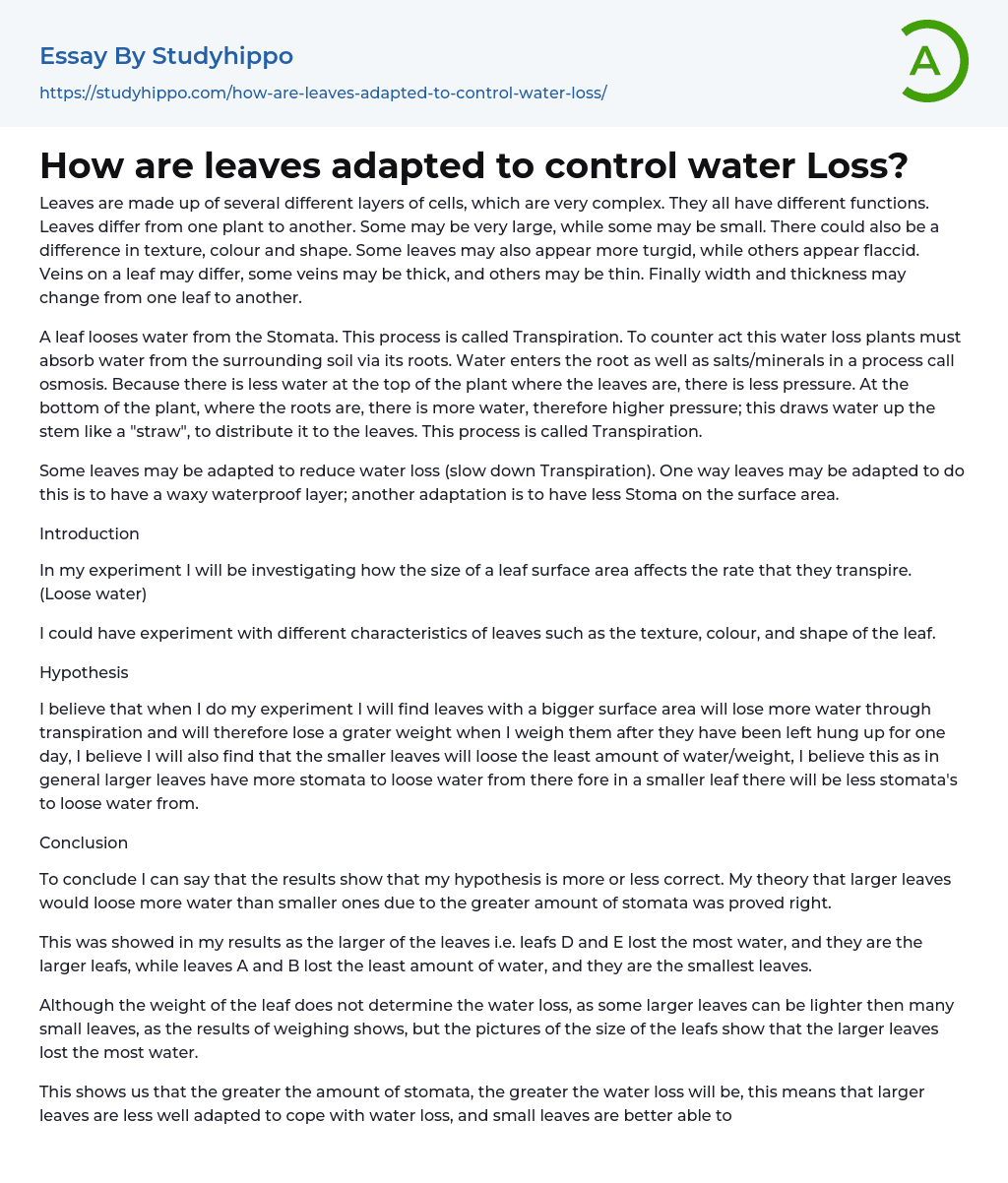Leaves are made up of several different layers of cells, which are very complex. They all have different functions. Leaves differ from one plant to another. Some may be very large, while some may be small. There could also be a difference in texture, colour and shape. Some leaves may also appear more turgid, while others appear flaccid. Veins on a leaf may differ, some veins may be thick, and others may be thin. Finally width and thickness may change from one leaf to another.
A leaf looses water from the Stomata. This process is called Transpiration. To counter act this water loss plants must absorb water from the surrounding soil via its roots. Water enters the root as well as salts/minerals in a process call osmosis. Because there is less water at the top of the plant where the leaves are, there is l
...ess pressure. At the bottom of the plant, where the roots are, there is more water, therefore higher pressure; this draws water up the stem like a "straw", to distribute it to the leaves. This process is called Transpiration.
Some leaves may be adapted to reduce water loss (slow down Transpiration). One way leaves may be adapted to do this is to have a waxy waterproof layer; another adaptation is to have less Stoma on the surface area.
Introduction
In my experiment I will be investigating how the size of a leaf surface area affects the rate that they transpire. (Loose water)
I could have experiment with different characteristics of leaves such as the texture, colour, and shape of the leaf.
Hypothesis
I believe that when I do my experiment I will find leaves with a bigger surfac
area will lose more water through transpiration and will therefore lose a grater weight when I weigh them after they have been left hung up for one day, I believe I will also find that the smaller leaves will loose the least amount of water/weight, I believe this as in general larger leaves have more stomata to loose water from there fore in a smaller leaf there will be less stomata's to loose water from.
Conclusion
To conclude I can say that the results show that my hypothesis is more or less correct. My theory that larger leaves would loose more water than smaller ones due to the greater amount of stomata was proved right.
This was showed in my results as the larger of the leaves i.e. leafs D and E lost the most water, and they are the larger leafs, while leaves A and B lost the least amount of water, and they are the smallest leaves.
Although the weight of the leaf does not determine the water loss, as some larger leaves can be lighter then many small leaves, as the results of weighing shows, but the pictures of the size of the leafs show that the larger leaves lost the most water.
This shows us that the greater the amount of stomata, the greater the water loss will be, this means that larger leaves are less well adapted to cope with water loss, and small leaves are better able to cope with water loss as generally the stomata count is lesser than the count of the larger leaves. This is so because on a larger leaf there is more surface area to contain the stomata's.
Evaluation
To evaluate
I can say that my results were as I expected. I think the experiment went more or less as we planned and were pleased with the results achieved. I have to say that some results in the tables were a bit wild, although this could be put down to chance, or inaccurate weighing methods. I believe that the weight of the leaf may not have been the best variable to base the investigation around, so am glad of the choice to investigate the size of leaf.
Over all I am pleased with the way I carried out this investigation, and with the results achieved.
- Microbiology essays
- Bacteria essays
- Cell essays
- Enzyme essays
- Photosynthesis essays
- Plant essays
- Natural Selection essays
- Protein essays
- Viruses essays
- Cell Membrane essays
- Human essays
- Stem Cell essays
- Breeding essays
- Biotechnology essays
- Cystic Fibrosis essays
- Tree essays
- Seed essays
- Coronavirus essays
- Zika Virus essays
- Organic Chemistry essays
- Acid essays
- Calcium essays
- Chemical Bond essays
- Chemical Reaction essays
- Chromatography essays
- Ethanol essays
- Hydrogen essays
- Periodic Table essays
- Titration essays
- Chemical reactions essays
- Osmosis essays
- Carbohydrate essays
- Carbon essays
- Ph essays
- Diffusion essays
- Copper essays
- Salt essays
- Concentration essays
- Sodium essays
- Distillation essays
- Amylase essays
- Magnesium essays
- Acid Rain essays
- Bottled Water essays
- Agriculture essays
- Albert einstein essays
- Animals essays
- Archaeology essays
- Bear essays
- Biology essays




